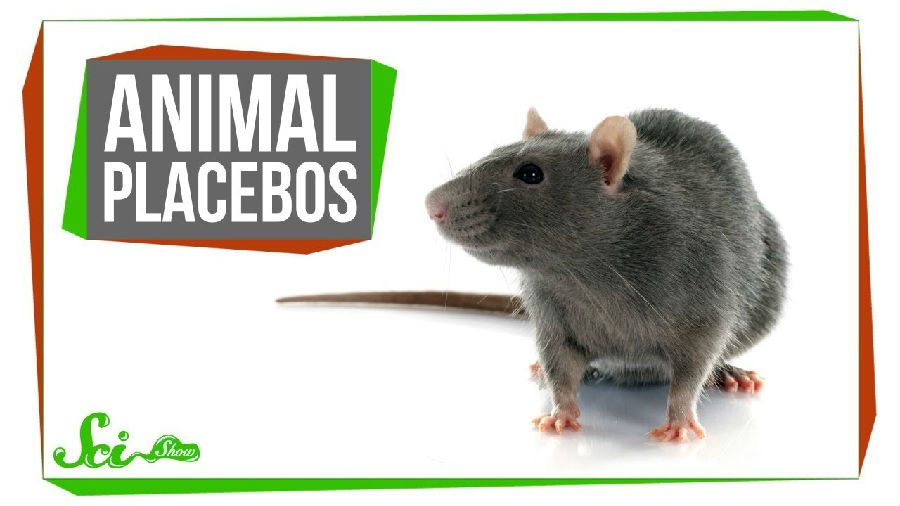If you know someone who swears that they're living proof coconut oil is the cure for everything,
如果一个你认识的人发誓说椰子油能够治愈一切,而且他们亲身证明,
you might be familiar with the placebo effect.
那么,安慰剂效应,了解一下?
That's when something with no real pharmaceutical power, like a sugar pill,
安慰剂效应是指那些没有实际药用效果的东西,比如说小糖片,
actually does help solely because someone believes it'll work.
确实起到了作用,这是因为有人相信这个东西是有用的。
But weirdly enough, animals also seem to be fooled by placebos.
但是奇怪的是,动物似乎也被这种安慰剂给骗了。
Which seems like something that definitely shouldn't be a thing, since they don't know what medicine is.
这似乎看起来也不应该是什么大事,因为动物也不知道药是什么。
Scientists have a few ideas, though, as to why these effects happen.
对于这些效应发生的原因,科学家知之甚少。
And their very existence could have serious implications for scientific research, especially drug testing.
而且它们的存在对科学研究,特别是药物测试有着严重影响。
We don't know a ton about how the placebo effect actually works, even in us,
对于安慰剂效应如何起作用,我们了解的不多,
but it's thought that it largely hinges upon you believing what you're taking has the power to fix what ails you.
但是普遍认为这种效应取决于你是否相信自己所服用的东西能够缓解病痛。
That's why it's kind of strange that dogs, rats, and other animals also seem to respond to placebos.
所以像狗狗、老鼠和其他动物似乎也对安慰剂有反应,这就有些奇怪了。
After all, a dog doesn't know what a pill is, let alone that it's supposed to fix something that's broken.
毕竟,狗狗并不知道什么是药片,更不必说期待这个药片能够治跌打损伤了。
Still, the effect has been documented in multiple studies.
但是这种效应还是在多种研究中有过记载。
For example, in a 2012 study, a group of 19 rats were trained to expose their faces to a painful heat source in order to get a treat.
例如,在一项2012年的研究中,一组19只老鼠经过训练,为了获取食物而将自己的脸暴露在热源之下。
Then they were injected with morphine, and offered the treat again.
然后给老鼠们注射吗啡并再次提供食物。
Since the morphine dulled the pain, they were less bothered by the heat.
由于吗啡可以缓和疼痛,它们不太受灼热的影响。
The eight that received saline instead of the painkiller were understandably less interested in the tasty reward.
8只注射盐水而非止痛药的老鼠明显对食物奖励没那么感兴趣。
After a couple rounds of this, the researchers switched to injecting both groups of rats with saline.
几回合后,研究人员转而给两组老鼠都注射盐水。
Yet the originally morphine group were still mostly willing to brave the heat,
而原先注射吗啡的那一组,大部分老鼠仍然勇敢的面对灼热,
even though they didn't have the painkiller anymore. For them, the saline acted as a placebo.
虽然它们再也没有止痛药护体了。对于它们而言,盐水就像是一种安慰剂。
And that's probably due to conditioning: where an individual is trained to react in a certain way to a signal.
这可能是由于条件作用:人体接受训练以某种方式对一个信号做出反应。
It's a phenomenon made famous by Russian physiologist Ivan Pavlov through his experiments with dogs,
俄罗斯生理学家巴甫洛夫通过他的狗狗实验,让这种现象为人所知,
who were trained to associate the sound of a bell with a juicy steak.
这些狗狗们经过训练,能够将铃声和一块美味的牛排相联系。
Eventually, the sound alone was enough to make them start drooling.
最终,仅靠声音就能让它们流口水。
Conditioning can lead to a special kind of placebo effect,
条件作用可导致一种特殊的安慰剂效应,
where the response to a medication is so strongly associated with the experience of receiving it
由于对一种药物的反应和服用药物后的体验强烈结合
that the body keeps responding even after it stops getting the actual drug, like seen in the rats in that 2012 study.
因此,在断药后,身体还是会一直产生反应,比如2012年的那个老鼠研究。
They were conditioned to associate an injection with less pain, so even when the stuff in the injection changed, their pain was still dulled.
它们习惯了将注射药物和疼痛的缓解相联系,即便是当注射药物被更换后,它们的疼痛仍有所缓解。
But not all animal placebo effects can be explained by conditioning.
但是并不所有的动物安慰剂效应都能用条件作用来解释。

For example, a 2010 meta-analysis examined three studies where epilepsy medication was tested in dogs.
例如,一项2010年的荟萃分析对三项研究进行检验,三项研究对狗狗进行癫痫药物测试。
The researchers found that 79% of the 28 pooches in the placebo groups had fewer seizures.
研究人员发现安慰剂组的28只杂种狗中,70%的狗狗癫痫症状更少。
It's less likely conditioning was at play in these studies.
在这些研究中,似乎不可能是条件作用的影响。
Still, scientists aren't 100% convinced that a true placebo effect explains things, either.
但是,科学家们也不能100%确认真正的安慰剂效应能够解释一切。
Something called the Hawthorne Effect could be the culprit instead, which is where someone,
有种被称为霍索恩效应的效应或许是其祸首,霍索恩效应是指
or an animal, improves just by being involved in a study.
人或动物,由于参与这项研究而有所提高。
That's because study subjects are closely monitored and cared for.
这是因为研究主题被密切监控和照顾。
Basically, they get more attention, so they tend to do better.
主要来讲,是因为他们获得了更多关注,所以他们倾向于做得更好。
Or, it might really be a placebo effect, but in the people involved in the studies, not the dogs.
又或者,真的是安慰剂效应的原因,但是是针对参与研究的人,而非狗狗。
The caregiver placebo effect can happen if the researchers or the animals' owners expect the treatment to be working,
如果研究人员或动物主人期待这个治疗起作用的话,也会发生看护者安慰剂效应,
which makes them more likely to report improvement. And that's something scientists have definitely seen.
研究人员或宠物主人的期待使参与者更可能报告有所改善的一面。这一点是科学家绝对有所见证的。
For example, a 2017 literature review re-analyzed five studies on cats with joint pain,
例如,一项2017年的文献回顾在此分析了患有关节痛的猫咪的五项研究,
and found that between about half and three quarters of cats on placebos were classified by their owners as improving.
他们发现服用安慰剂的猫咪中,有一半至四分之三的猫咪被他们的主人评估为有所改善。
But using more objective measures, only between 10 to 63 percent actually improved,
但是利用更加客观的方式来看,仅有10%到63%的猫咪是真的有所改善,
suggesting that some if not most of the supposed improvement was just in the owner's heads.
这表明大部分假设改善仅存在与主人的心里。
And it's actually a really big deal that these kinds of placebo or placebo-like effects can happen in animals,
重要的是,这些安慰剂或有安慰剂效果的东西对动物也有作用,
because we do a lot of research in animals.
因为我们对动物做了很多研究。
Before medications are prescribed by veterinarians, they undergo clinical tests similar to what we do with our drugs.
在兽医开具药物之前,他们进行了临床测试,和我们的药物测试相似。
And a lot of our pharmaceuticals are often tested in animals before they're tested in people.
很多人类药物,在对人类进行测试前,都会先在动物身上进行测试。
Placebo effect could make a dud seem like a wonderdrug.
安慰剂效应能让没用的东西看起来像是特效药。
Which can be especially dangerous because placebos usually just improve symptoms rather than treating the underlying cause.
这是特别危险的,因为安慰剂仅能改善症状而非治疗其根本病因。
An animal with cancer might act less ill on a placebo, but their tumor could still be growing.
患癌症的动物使用安慰剂似乎能缓解,但是它们的肿瘤仍在增长。
Or, placebos could make it seem like a good drug isn't effective, if the control group on a placebo does overly well.
或者,如果服用安慰剂的对照组看起来非常有效的话,安慰剂会让某种良药看起来没效果。
Further studies of the placebo effect in animals and how it might mess with clinical tests could help researchers design studies that minimize these pitfalls.
在动物身上进行安慰剂效应的进一步研究以及如何将安慰剂效应和临床测试相结合能够帮助研究人员设计研究,将其缺陷最小化。
Because the phenomenon definitely exists, even if it seems like it shouldn't.
因为这种现象是真实存在的,即使它似乎不应该存在。
And it just might explain why that friend of a friend of yours thinks that homeopathic drops are curing their pup's arthritis.
这或许能解释为什么你朋友的朋友觉得顺势疗法的滴剂能够治愈他们狗狗的关节炎。
Thanks for watching this episode of SciShow!
感谢收看本期《科学秀》!
If you like learning about the brain and how it works, well, we have an entire channel dedicated to that!
如果你想了解大脑以及大脑如何工作,我们有专门的频道进行讲解!
You can head over to youtube.com/scishowpsych to check it out.
登录youtube.com/scishowpsych进行观看。











